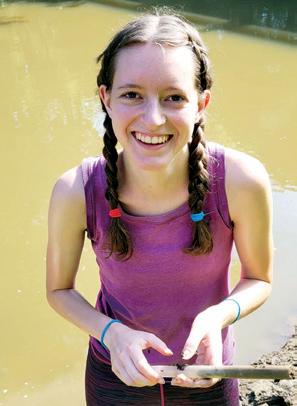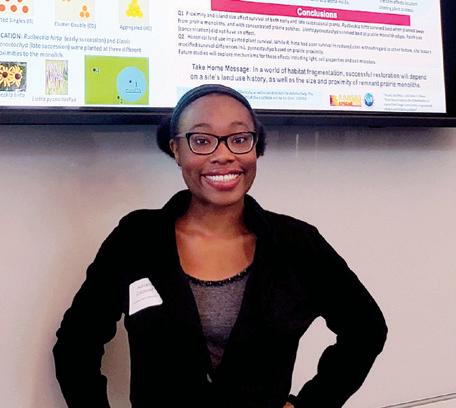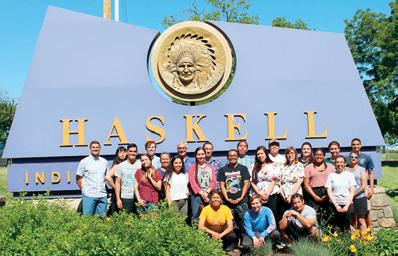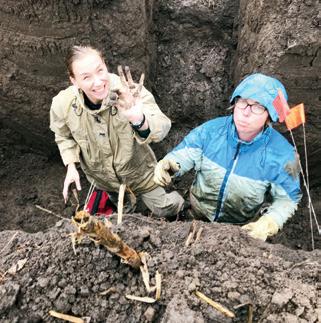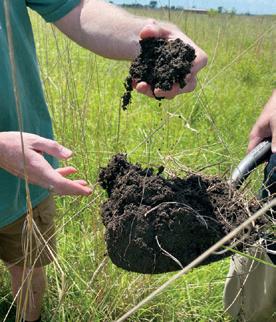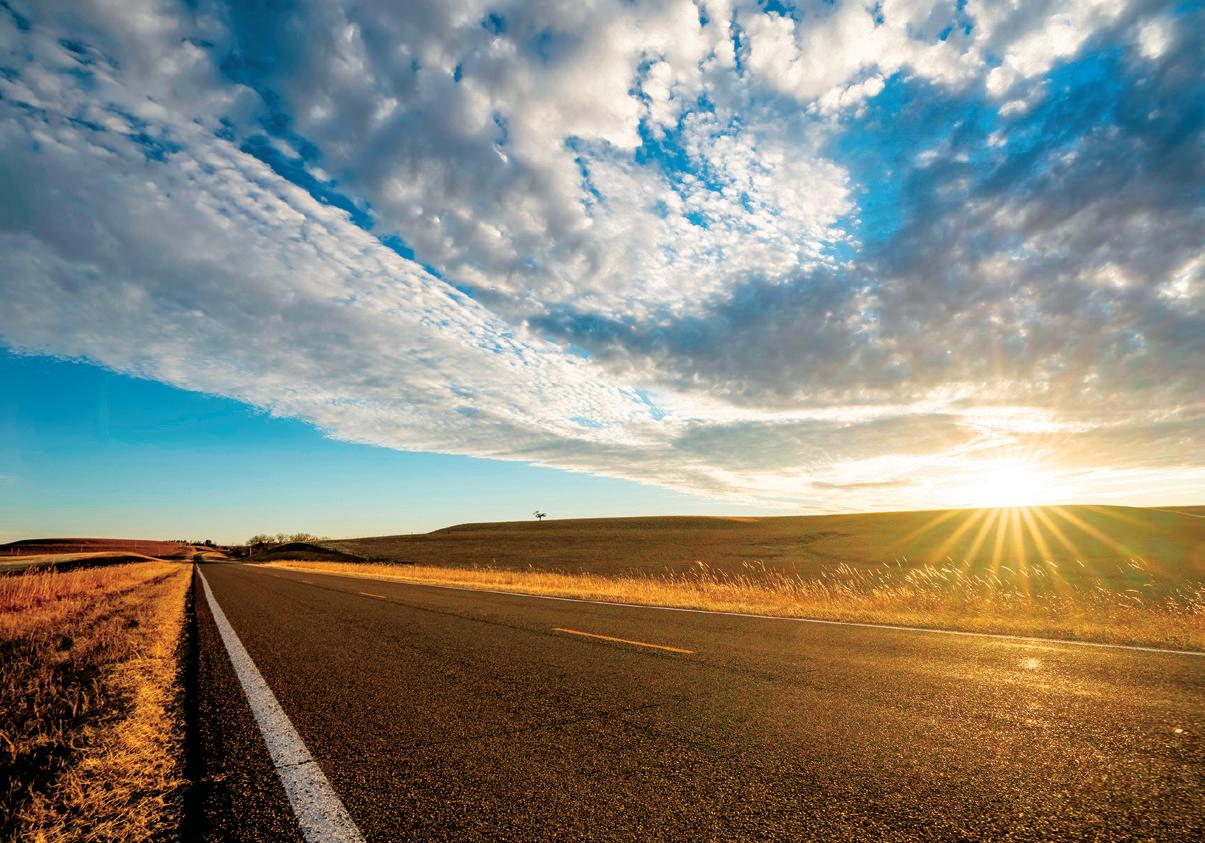
Linking Learners and Leaders in Kansas




The Kansas NSF EPSCoR program has a mission to stimulate competitive research across the state. This research is anchored to state priorities, as outlined in the Kansas Science & Technology Plan, and encompasses workforce development, innovation, and discovery. We like to say that our office facilitates research for Kansans, by Kansans

Last fall, I was honored to step into the director position following Kristin Bowman-James. She served tirelessly in this role for 18 years, leading multiple major initiatives like the one described on page 18. Since launching in 1992, EPSCoR — the Established Program to Stimulate Competitive Research — has been a spark to spur collaboration and glue to link universities, community colleges, businesses and more.
Our current project called ARISE focuses on disaster resilience, as spotlighted in this annual review. While some of the researchers work in labs, others are working within communities to understand needs and to survey Kansans in public spaces. The project will continue through 2027. Its vision is to build research capacity in Kansas by creating a new social equity-driven paradigm for resilience analysis that, through a pipeline of community leaders and decision-makers, will transform how communities invest in, and manage, infrastructure. The project is also developing industry-engaged data science curriculum across universities and community colleges.
Our strong track record positions Kansas to leverage exciting new federal initiatives, like the CHIPS and Science Act. This 2022 law doubles the National Science Foundation (NSF) budget over five years and ramps up the portion set aside for EPSCoR jurisdictions from 15.5% in FY23 to 20% in FY29.
NSF has new opportunities on the horizon through the E-CORE and E-RISE initiatives announced in 2023. The Kansas NSF EPSCoR office has been working to build research capacity in Kansas for more than 30 years, and we are positioned to grow in the coming years. I look forward to cultivating collaborations and enthusiastically welcome partners to work together on these initiatives.
Thank you to our team and partners for all your help planting the seeds of innovation to help economic growth and talent take root statewide.
Belinda Sturm Project Director (ARISE)At Kansas NSF EPSCoR, we seek to enable scientific discovery and cultivate a highly skilled, diverse workforce statewide.
The clunky acronym, NSF EPSCoR, stands for a clever strategy by the U.S. National Science Foundation known as the Established Program to Stimulate Competitive Research. With bipartisan congressional support, EPSCoR spurs innovation and opportunity in traditionally underfunded regions of the country—like Kansas.
As a result of our efforts, Kansas has become more competitive in acquiring federal funding. For every dollar we pump into research, Kansas scientists have received more than double that in other grants.
We take pride in facilitating partnerships that make Kansas stronger. By connecting universities to each other and to businesses, nonprofits, residents, researchers, and more, we help weave together our state’s unique assets. These connections not only enhance discovery. They boost access to education and spark economic growth.
Since 1992, Kansas scientists have landed eight major NSF EPSCoR awards.
KANSAS STATE UNIVERSITY*
BARTON COMMUNITY COLLEGE BETHANY COLLEGE
GARDEN CITY COMMUNITY COLLEGE*
SEWARD COUNTY COMMUNITY COLLEGE*
DODGE CITY COMMUNITY COLLEGE*
MCPHERSON COLLEGE
WICHITA STATE UNIVERSITY*
FRIENDS UNIVERSITY
BENEDICTINE COLLEGE
THE UNIVERSITY OF KANSAS*
BAKER UNIVERSITY*
EMPORIA STATE UNIVERSITY*
BUTLER COMMUNITY COLLEGE*
KANSAS CITY KANSAS COMMUNITY COLLEGE*
DONNELLY COLLEGE*
JOHNSON COUNTY COMMUNITY COLLEGE*
FORT SCOTT COMMUNITY COLLEGE
*Funded partners
Shaded circles represent location of partner communities in five Kansas counties: Ford, Finney, Seward, Johnson, and Wyandotte.RESEARCH CAPACITY
24 New faculty hired $ 77 million In scientific discovery and multi-user equipment since 1992
481 Research papers published since 2006
799 Undergraduate and graduate students trained
55 High school teachers gained classroom resources
New hub for data science connects students with community partners, offering data solutions free of charge.
(See story on page 7)
214 Students trained trained in data sciences
47 Partners sharing data
38 Real-world data projects
2.6 to 1 return on investment. For every federal dollar from NSF pumped into EPSCoR Track-1, Kansas got back more than double that in other grants, leveraging $150M from a $58M investment since 2006.

With extreme weather events and cyberattacks on the rise, a team of Kansas scientists aim to bolster resilience across the state. But rather than looking for answers just in the lab — they are co-creating solutions with Kansas residents to ensure equitable support for rural and urban communities.
The team is part of a statewide initiative called ARISE, which stands for Adaptive and Resilient Infrastructures driven by Social Equity. This five-year project leverages $20 million from the U.S. National Science Foundation and $4 million from the Kansas Board of Regents to advance research for safeguarding water, energy, and transportation systems. It also seeks to strengthen the state’s economy and workforce, as described in this newsletter.
Since launching in 2022, ARISE has nurtured collaborations between roughly 70 researchers from Kansas State University, the University of Kansas, and Wichita State University. The team also partners with nine other colleges and dozens of businesses, municipalities, and nonprofit organizations.
To date, more than 100 residents in the Kansas City Metro and the southwestern counties of
Ford, Finney, and Seward have engaged with ARISE investigators. Embedding research in these target areas ensures that each region’s unique challenges are considered as the team develops a cutting-edge computer modeling tool that integrates cyber, physical, and social systems into a single framework.
Belinda Sturm, interim vice chancellor for research at KU, leads ARISE with Bala Natarajan, professor of electrical and computer engineering at K-State, and Elaina Sutley, associate professor of civil, environmental & architectural engineering at KU.
If you are a Kansan and want to get involved in boosting the resilience of your community, contact us at nsfepcsor@ku.edu.
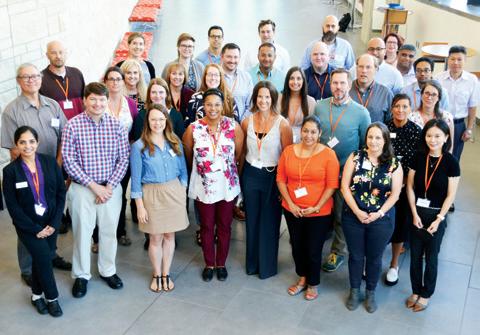 How the ARISE project seeks to build the state’s economy, talent, and resilience.
Members of ARISE at a team event.
How the ARISE project seeks to build the state’s economy, talent, and resilience.
Members of ARISE at a team event.

Small businesses, townships, and nonprofits rarely have the expertise for advanced data analytics. We are filling this need in Kansas, driving both workforce and economic development.
Got data? Of course you do! Digital information flows freely across every segment of the economy.
But harnessing the power of data takes specialized skills in math, statistics, coding, and more. The ARISE project launched the Kansas Data Science Consortium (KDSC) in 2022 to build those skills statewide.
At its core, this consortium links learners and employers for both workforce and economic development.
Here’s how.
Businesses, nonprofits, and other organizations partner with the KDSC, sharing data for class projects. College students then work on those projects as part of a course. As they learn to wrangle and analyze data, students glean insights for their partner organization while gaining skills for high-demand careers.
The consortium’s new data science courses — called Community Data Labs — are currently taught at Kansas State University,
the University of Kansas, and Wichita State University. Efforts are underway to infuse this curricula into courses at other universities and colleges across Kansas.
To date, more than 200 students have enrolled in the courses. Datasets shared by 20 organizations have been analyzed so far, leading to reports, dashboards, slide decks, and code, as requested by the organization.
“Working with the KDSC has been fantastic,” said Derek Kwan, executive director of the Lied Center of Kansas. “Most arts organizations and nonprofits in general do not have the bandwidth to rigorously analyze their customer relationship management databases. The insight provided by KDSC student Nikita Kuzin has been invaluable in helping
 Left to right: Derek Kwan, executive director of the Lied Center of Kansas, KU senior Nikita Kuzin, and KU Assistant Research Professor Will Duncan.
Left to right: Derek Kwan, executive director of the Lied Center of Kansas, KU senior Nikita Kuzin, and KU Assistant Research Professor Will Duncan.
“It is exciting to see the KDSC forming from a vague concept into a vibrant venture that combines academia with small businesses and non-profit organizations.”
the Lied Center refine our approaches to both fundraising and attracting ticket buyers. We look forward to a continued relationship.”
The consortium is also creating an online repository of teaching materials designed to benefit schools and organizations of all types who seek to enrich their data science programming.
“It is exciting to see the KDSC forming from a vague concept into a vibrant venture that combines academia with small businesses and non-profit organizations,” said Lior Shamir, associate professor of computer science at K-State.
Class projects data sets include urban streams, adult sports, and broadband access to bachelor’s degrees. One project examined wage data in the state, leading to an externally funded project to help the Department of Commerce and companies in
Kansas understand the costs and benefits of the registered apprenticeship program.
“I gained a lot of hands-on experience by working on a real-world dataset,” said Nikhil Saka, 2023 graduate from Wichita State University. “This [course] enhanced my data analytic skills and data visualization skills. It also helped me understand machine learning algorithms better.”
Michael Branicky, professor of electrical engineering and computer science at the University of Kansas, co-leads the KDSC with William Duncan, assistant research professor of data science at KU, and Jeffrey Girard, assistant professor of psychology at KU. Other team members hail from Kansas State University, Wichita State University, Baker University, Butler Community College, Donnelly College, and Johnson County Community College.
To learn more, direct inquiries to KDSC Program Coordinator Gryffin Eason at g.eason@ku.edu.


In 2023, Kansas NSF EPSCoR announced 15 awards for faculty to initiate research in Kansas. Each award of up to $50,000 supports a year of research. All were funded by the ARISE project.
Two types of grants were awarded. First Awards support early career, non-tenured faculty. Research and Education Innovation (REI) Awards support investigators at all levels, with preference for topics related to machine learning, resiliency planning within Indigenous communities, and emergency management.
Both types of seed grants give investigators a chance to explore a novel area of study and gather the data, expertise, and collaborations needed to successfully compete nationally for larger grants. They also create opportunities for workforce and economic development across the state.
Award recipients are using the funding to study a range of compelling research topics that are relevant to Kansans, including advances in lithium-ion battery technology, data literacy, drought forecasting, and novel tools to strengthen security of critical infrastructure.
The 2023 award recipients and their projects are listed on the following pages.

Davood Babaei Pourkargar, Assistant Professor
Tim Taylor Department of Chemical Engineering, Kansas State University
Distributed green ammonia generation for resilient energy storage and fertilizer production in rural communities

Xiaolong Guo, Assistant Professor Electrical and Computer Engineering, Kansas State University
LLM4KSS: Large-language Models for Kansas Science

Amanda Hovious, Assistant Professor
School of Library and Information Management, Emporia State University
Data Literacy for All: A Kansas Public Library Initiative

Zelalem Demissie, Assistant Professor
Department of Geology, Wichita State University
The use of Radar technology and AI techniques to forecast early-stage drought in Kansas

Davi Soares, Assistant Professor Electrical and Computer Engineering, Wichita State University
Physics-informed machine learning model for assessment of state of health of lithium-ion batteries used in resilient infrastructure applications
Since 1992, Kansas NSF EPSCoR has invested in 170 assistant professors with its First Award program. Awardees hail from six universities in Kansas. Many have gone on to win prestigious federal grants and achieve national recognition — two key metrics of the program’s success at building lasting research capacity in Kansas.

Shakil Bin Kashem, Associate Professor Landscape Architecture and Regional & Community Planning, Kansas State University
Virtual and Augmented Reality Technologies for Enhancing Disaster Risk Awareness in Vulnerable Communities

Joseph P. Brewer, II, Associate Professor Environmental Sciences Director, Indigenous Studies Program, University of Kansas
Native Prairie Restoration & Climate Resilience on the Ioway Nation in Kansas and Nebraska

S. Amin Enderami, Postdoctoral Researcher Department of Civil, Environmental, and Architectural Engineering, University of Kansas
Evaluating Feasibility of Buyouts as Adaptation Strategy for Post-Wildfire Flash Floods

Ali Eslami, Associate Professor
Department of Electrical and Computer Engineering, Wichita State University
Developing a Network Science to Study Cascading Failures in the Cyber-Physical Infrastructure

Jeffrey Girard, Assistant Professor Psychology, University of Kansas
Kansas Data Science Training Pathways | An Integrated Model

Admin Husic, Assistant Professor Civil, Environmental, and Architectural Engineering, University of Kansas
The inequity of urban flooding: exploring societal and climatic drivers across scales

Christopher Koliba, Stene Distinguished Professor School of Public Affairs and Administration, University of Kansas
An Institutional and Behavioral Design Approach to Improving the Use of Flood Forecast Information for the Kansas City Metro Portion of the Missouri River Basin

Ajita Rattani, Assistant Professor School of Computing, Wichita State University
Understanding and Mitigating Bias of AI-based Natural Disaster Assessment Models for Rescue Coordination and Resiliency

Ehsan Salari, Associate Professor
Department of Industrial, Systems, and Manufacturing Engineering, Wichita State University
Modeling Electric-vehicle (EV) Infrastructure Resilience Using a Socioeconomic Approach

Wujun Si, Assistant Professor
Department of Industrial, Systems, and Manufacturing Engineering, Wichita State University
Integrating Social Equity into Infrastructure Maintenance Planning Towards Resiliency
A new program for Kansas City youth called Build Your Future engages students from Kansas City, Kansas public schools in science and engineering
In fall 2023, 38 Wyandotte County middle schoolers got a chance to learn about extreme weather and disaster preparedness at three Saturday events led by the University of Kansas Natural History Museum. The new youth program — called Build Your Future — is a key educational pillar of the ARISE project.
Teresa MacDonald, associate director of informal science education at the KU Natural History Museum, leads the program. Her team includes museum staff Eleanor Gardner and Carolyn Kocken, KU’s TRIO Talent Search Director Rebecca Dukstein, and several student assistants.
Dr. MacDonald said that they initially planned for 25 students to participate, but it was way more popular than expected, with 38 total participants arriving the first day and a waiting list.
High turnout was not the only notable outcome.
The team was thrilled to see that the students maintained a strong commitment, with most attending all three Saturday events from late September through mid-November. Students also reported that the experience left them feeling more knowledgeable about and prepared for a natural disaster, and all but one student reported that they learned about science & engineering.
The events were held at the F.L. Schlagle Public Library in Kansas City, Kansas. With its environmental learning center, this library has outdoor space that can be used for handson curriculum.
At the first session, students collected and analyzed data such as temperature, soil and air quality, and biological diversity to learn about differences between natural and built environments. At the second and third sessions, they explored tornadoes, flooding, extreme heat, and winter storms, using games and other activities to learn about ways to limit damage from disasters. The third and final session concluded with each student taking home a basic preparedness kit with an emergency weather radio and a stipend for participation.
For the next three years, the team will offer this program again in the fall along with a series of ‘family STEM nights’ in the spring. Hundreds of KCK youth and families will benefit — gaining knowledge, resilience, and pathways toward future careers of consequence to Kansas.

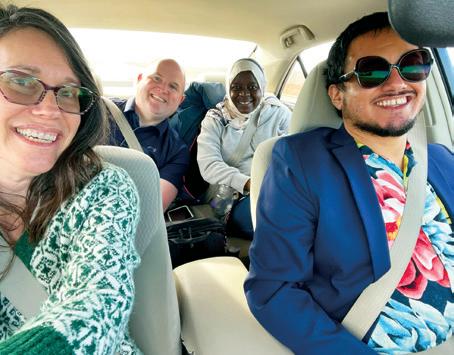
Four members of the ARISE team went on a road trip across Kansas in fall 2023. Picture this — warm Kansas sunsets, open roads, and a whole lot of insightful conversations about community resilience.
K-State Professor Jason Bergtold (center left) and his graduate student Mariam Gharib traveled to Dodge City with program coordinator Alej Martinez (right), along with Claudia Bode (left), who oversees education and outreach efforts for Kansas NSF EPSCoR.
The journey took them from bustling urban areas to serene rural landscapes. From northeast to southwest, they trekked across 20 counties to arrive in Dodge City after a beautiful sunset.
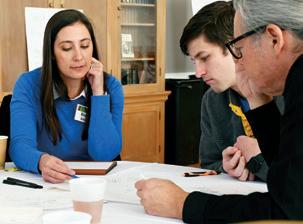
The next day, they hosted a focus group with community members, chatting about the resilience of their households. Each resident had a unique story of challenges and strengths, sharing a colorful mosaic of experiences. They also met with students at Dodge City Community College, sharing information about a summer research opportunity with ARISE. The week wrapped up in Olathe, where Alej Martinez joined KU Professor Elaina Sutley to lead a roundtable discussion about the ARISE project with Johnson County employees and leaders.
Outreach forums ensure that diverse views, from individuals to institutions to governing partners, are included in ARISE research.
“In other words, social equity is truly at the heart of all our community engagement,” said Alej Martinez. “We don’t see communities as research subjects but as equal partners. We want rural and urban residents to take the reins, control their stories, and use this project for their benefit. We’re on a mission to build capacity for research and resources that actually make a difference in people’s lives.”
“We don’t see communities as research subjects but as equal partners.”Elaina Sutley (left), associate professor of civil, environmental, and architectual engineering at KU.
To enrich the lives of youth in Kansas City, Kansas, the ARISE project partners with the Saturday Academy. This long-running program is co-led by the Kansas City Kansas Community College, the University of Kansas Medical Center, and the USD 500 School District.
Every other Saturday from November to May, roughly 100 teens gather for a day of teambuilding, poetry, technology, and science modules. Mary Patterson is one of three instructors for the academy. She integrates infrastructure and other concepts from the ARISE project into the academy’s data science module.
“Being part of ARISE has been a fantastic way to connect with researchers in Kansas and to learn about infrastructure,” said Dr. Patterson. “These connections and collaborations have allowed our Saturday Academy students to learn more about careers and the world around them.”
In 2022, the academy covered air and water quality. This year, the focus is on soil. Using Google Earth Pro, sensors, and other equipment, the students create maps of soil quality at KCKCC. They also learn about erosion, no-till farming, and soil contamination and remediation.
In addition, Dr. Patterson tapped the ARISE project to enhance a five-weeklong Health Science Academy for about 30 KCK high school students. She invited three of ARISE researchers from the University of Kansas — Postdoctoral Researcher Amin Enderami, Associate Research Professor Jude Kastens, and Assistant Professor Joel Mendez — to share advice about careers in engineering, math, and urban planning. She also got help scheduling a tour for the group.
“For MONTHS I tried to get a hold of anyone that could get us a tour of Nearman Water Treatment plant here in KCK,” said Dr. Patterson. A breakthrough came at the 2023 ARISE Annual Symposium when she met Tonya Bronleewe, Director of WSU’s Environmental Finance Center and ARISE partner. Tonya knew who to contact to set up the tour — and that connection made all the difference.
Experiences like these open students' eyes to career paths they might not have considered otherwise, broadening access to higher education and diversifying the state’s workforce.
To learn more, contact Mary Patterson, pattersonm@kckcc.edu.

K-State engineering professor, Bala Natarajan, began leading a nearly $1 million project to enhance community power grid resilience in Ford County. This exciting twoyear project funded by the U.S. Department of Energy leverages and complements the ARISE project. It includes fellow ARISE investigators: George Amariucai, associate professor of computer science, Jason Bergtold, professor of agricultural economics, and Anil Pahwa, university distinguished professor engineering.
Jomella Watson-Thompson, KU applied behavioral science professor, was recognized for research excellence at a KU Athletic event for her work on creating safe and supportive communities where all young people can thrive. She leads community engagement efforts for ARISE and collaborates with community partners in Kansas City to help prevent youth violence.
KU postdoctoral researcher Hsi-Chuan (Andrew) Wang received a 2023 Case Study Award (and $2,000) from the Association of Collegiate Schools of Planning for his study on building resilience in Accra, Ghana.
K-State graduate student Priyanka Gautam was selected for an intensive weeklong conference hosted by the American Mathematical Society in New York, where she gained mentoring, research skills, and professional connections.
K-State graduate student Adaeze OkeukwuOgbonnaya spent her summer as a Connected Vehicle Software Intern with Ford Motors. While much of the work was remote, she visited the Ford office in Dearborn, Michigan, for a week in July.
K-State graduate student Kelechi Igwe won third prize in a research competition at the annual international meeting of the American Society of Agricultural and Biological Engineers in Nebraska.
KU undergrad Carter Hassman interned for a summer with the K-State Pollution Prevention Institute.
KU graduate student Madison Graham and her nonprofit co-founder won the Community Partner Excellence in Campus Collaboration Award from KU’s Center for Service Learning.

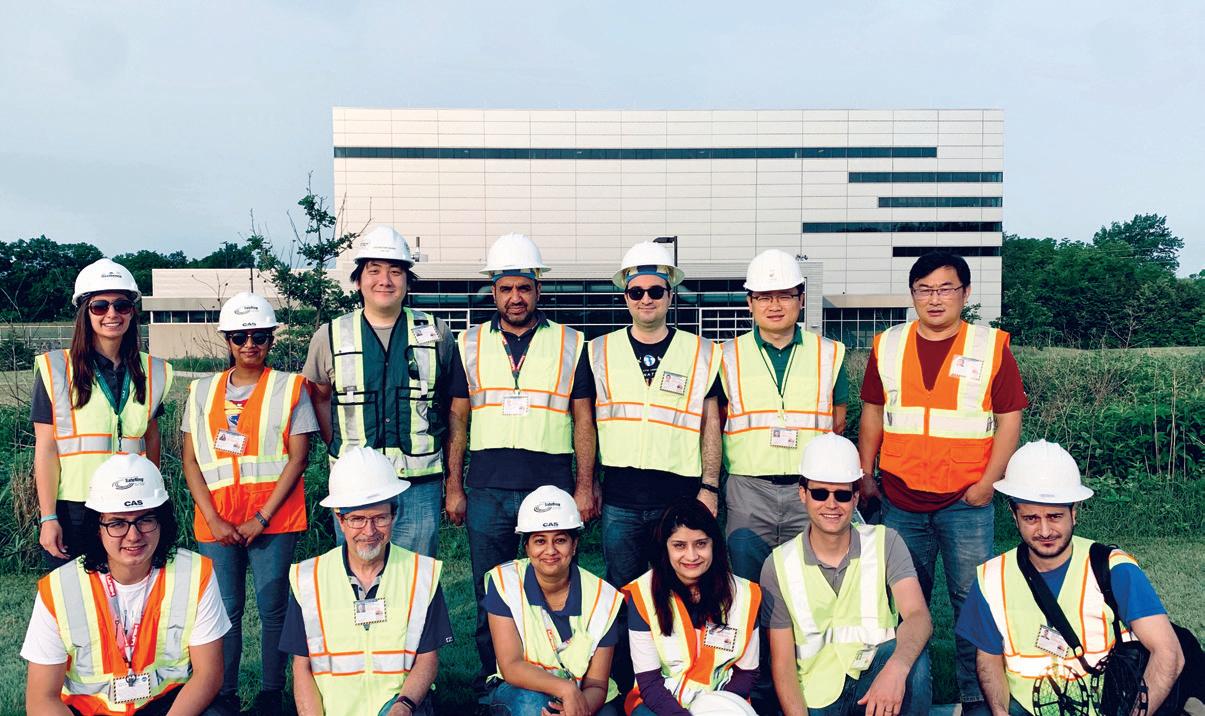
For K-State Professor Jason Bergtold, summer means more than sunshine. It is the season of immersive ‘Research Experiences for Undergraduates,’ or REU for short.
Dr. Bergtold spearheads the ARISE project’s REU program, titled “Seeking Equitable Pathways to Community Disaster Resilience.”
For the next three summers, he will oversee about 12 students engaging in team-based interdisciplinary research from May to August.
The program is unlike any other in the state in several ways.
First, faculty at K-State, KU, and WSU will mentor the undergrads, leaving them with a larger professional network than what would be gained by other single-campus programs.
An emphasis on community-engaged research is also unique. Learning to use
this methodology will help students better understand the perspective and local knowledge of our community partners, which is essential for building resilience to disasters.
Students will also get a chance to visit communities in western and northeastern Kansas for authentic fieldwork, seeing firsthand the challenges faced by rural and urban residents. Other training activities will strengthen professional skills and chart a course for careers in science, engineering, and technology.
Besides the $6,000 stipend, students receive housing and meals. Kansas buffalos, butterflies, and big-sky vistas are an added bonus!

In fall 2023, several ARISE investigators gave presentations about their work at conferences. Some talks were given locally, some out of state, and one was even overseas. All promoted knowledge sharing and provided opportunities to network with other researchers.
K-State Postdoctoral Researcher Amulya Sreejith presented her research in Glasgow, Scotland, at the 14th IEEE International Conference on Communications, Control, and Computing Technologies for Smart Grids. Dr. Sreejith was thrilled about her trip to Scotland, especially by all the positive feedback from the audience. But one question stood out. When asked about how she (as an electrical engineer) would be able to model the community requirements for her project, Dr. Sreejith was quick to respond that through ARISE, she gets to collaborate with social scientists who help connect her research to Kansas communities.
WSU Undergraduate Mary Peterson won first place in the best paper competition at the 2023 North American Power Symposium in Asheville, NC, sharing research on the economic and reliability impacts of combined solar and battery energy storage. “This is a collaborative work between WSU and industry partner Sunflower Electric Power Corporation,” said her mentor Visvakumar Aravinthan, associate professor and department chair of electrical and computer engineering at WSU.
KU Postdoctoral Researcher Amin Enderami presented his research at the ASCE INSPIRE Conference in November in Washington D.C. When asked about what he gained from his conference, Dr. Enderami said, “It was not only informative, but also transformative. The conference solidified my understanding of the pivotal role civil engineers play in shaping the future of our communities.”

KU Assistant Research Professor William Duncan presented data science results for a project commissioned by the Kansas Department of Commerce on the state’s Registered Apprenticeship Program at the 2nd Annual Kansas Apprenticeship Summit in Wichita.
KU Graduate Student Kenneth Ekpetere and his mentor Jude Kastens presented at the Governor’s Water Conference in Manhattan, Kansas.
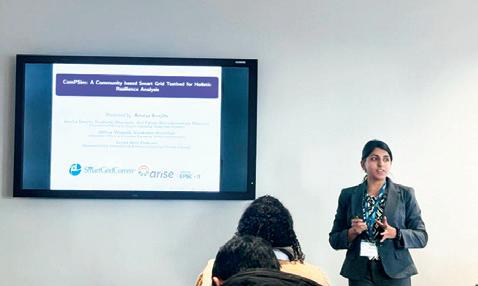

Research sheds light on a path for farmers to both feed the world and slow climate change.
A major Kansas NSF EPSCoR project concluded in December 2023. Titled Microbiomes of Aquatic, Plant, and Soil Systems across Kansas, or MAPS, this six-year initiative leveraged a $20 million award from the National Science Foundation to build research capacity in Kansas.
Since launching in 2017, the MAPS project has enabled partnerships between dozens of faculty members and more than 70 students across the University of Kansas, Kansas State University, Wichita State University, Fort Hays State University, and Haskell Indian Nations University. It was further bolstered with a match of $2 million from the Kansas Board of Regents and $2 million from each institution.
The project’s conclusion also marks the end of an era in leadership. Kristin BowmanJames, distinguished professor of chemistry at KU, oversaw the project as its principal investigator. For the past 18 years, she led this and three similar initiatives as the director of Kansas NSF EPSCoR. Taking over the role is Belinda Sturm, professor of civil engineering and interim vice chancellor for research at KU.
The project’s mission was driven by a vision that one day, microbiomes can benefit ecosystems, much like how gut microbes aid digestion. In other words, the team envisioned using microbes to sustain crops in droughts, improve water quality, beef up carbon in soil, and solve other ecological challenges.
Despite a year-long shutdown during the pandemic, the team published more than 90 scholarly articles, making numerous key discoveries of high priority to Kansas.
For example, little was known about how fertilizer and other materials are filtered by vegetation bordering streams before MAPS started. Now, with this team’s novel experimental approach, we know how highly efficient these regions are at ammonium removal, and we have a tool to learn even more in the future.
Moreover, they solved the mystery of why lands with mixed plant types can be more productive and stable than single species croplands. The culprit: microorganisms. Hard data from these experiments shows how mixed plant's communities keep pathogens at bay. Another finding revealed a link between a plants’ homesite and its local microbes, supporting the “home field advantage” hypothesis.
Multiple studies by the team looked at how soil microbes impact the structure and carbon levels of grasslands — gleaning numerous insights for solving major concerns about the Earth’s changing climate.
As a result of this project, Kansas scientists have also become more competitive in acquiring federal funding, leveraging the project to garner at least $35 million in additional funding. Research expertise was bolstered because of the project’s four faculty hires at the participating universities.
Education saw enhancements as well. The team created two new college courses, shared science with 54 elementary classrooms, and uploaded 7 YouTube videos in English and Spanish. Summer programs supported 55 secondary teachers and 53 Native American interns. Moreover, the project’s mobile museum trekked 700 miles to share bilingual exhibits statewide.
“MAPS was a fantastic group to work with,” said Walter Dodds, university distinguished professor of biology at K-State and theme leader for the project. “The EPSCoR support for this project and others in the past has been much appreciated.”
While the MAPS project ends, Kansas NSF EPSCoR carries on with its eighth major initiative, called ARISE, which seeks to advance research on resilient, socially equitable infrastructures.

